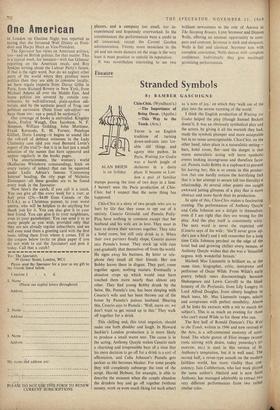t heatre
Stranded Symbols
By BAMBER GASCOIGNE Chin-Chin. (Wyndham's.) —The Importance of Being Oscar. (Apollo.) —This Way to the Tomb. (Arts.) THERE is an English tradition of turning down-and-outs into lov- able old things and agony into pathos. In Paris, Waiting for Godot was a harsh jangle of ALAN BRIEN skeletons in a dusty is on holiday place. It became in Lon- don a pair of familiar tramps passing the time of two days in a lane. I haven't seen the Paris production of Chin- Chin, but I suspect that the same thing has happened.
Chin-Chin is a story of two people who are so hurt by life that they come to opt out of it entirely. Cesario Grimaldi and Pamela Puffy- Picq have nothing in common except that her husband and his wife are in love. They meet in bars to drown their sorrows together. They take a hotel room, but still only drink in it. When their own partners finally elope, Cesario moves into Pamela's house. They stock up with rum and gradually shut themselves off from the world. He signs away his business. By letter or tele- phone they insult all their friends. Her son Bobby leaves them in disgust. They part, come together again; nothing matters. Eventually a situation crops up which would once have touched them more nearly than almost any other. They find young Bobby drunk by the Seine. He, Pamela's son, has been sleeping with Cesario's wife and has been thrown out of the house by Pamela's jealous husband. Hearing this, Cesario says to Pamela: 'Well, move on; we don't want to get mixed up in this.' They walk off together for a drink.
This chilling end, this total negation, should make one both shudder and laugh. In Howard Sackler's London .production it is more likely to produce a small warm tear. The cause is in the acting. Anthony Quayle makes Cesario such a charming and irrepressible bear of a man that his mere decision to go off for a drink is a sort of affirmation, and Celia Johnson's Pamela gets perkier as life becomes bleaker. For some people they will completely submerge the tone of the script. Harold Hobson, for example, is able to describe the moment when the couple abandon the drunken boy and go off together (without money, work or even much liking for each other) as 'a note of joy,' on which they 'walk out of the play into the serene morning of the world.'
I think the English production of Waiting for Godot helped the play (though Samuel Beckett doesn't). It was an obviously symbolical play and the actors, by giving it all the warmth they had, made the symbols plumper and more acceptable but in no sense unrecognisable. Chin-Chin, on the other hand, takes place in a naturalistic setting— bars, hotel room, flat—and the danger is that warm naturalistic acting will leave symbolic events looking incongruous and therefore farci- cal. Pamela locks Bobby in a cupboard to prevent his leaving her; this is so comic in this produc- tion that one hardly notices the horrifying fact that it is her attempt to secure (all too literally) a relationship. At several other points one caught awkward jutting glimpses of a play that is more abstract and more harsh than its production.
In spite of this, Chin-Chin makes a fascinating evening. The performances of Anthony Quayle and Celia Johnson are a delight in themselves, even if I am right that they -are wrong for the play. And the play itself is consistently witty. The next word is never the expected one (Cesario says of his wife: 'She'll never grow up. she's just a bird') and I will remember for a long time Celia Johnson perched on the edge of the hotel bed and growing chillier every minute, as Anthony Quayle wishes that she was a 'beautiful negress with wonderful breasts.'
Micheal Mac Liammdir is brilliant as, at the same time, biographer, critic, interpreter and performer of Oscar Wilde. From Wilde's early poetry (which veers disconcertingly between Shakespeare and Lewis Carroll) to the bleak honesty of Dc Profundis, from Lily Langtry to Lord Alfred Douglas, from silvery laughter to black tears, Mr. Mac Liammdir ranges, selects and compresses with perfect sensibility. Above all he links his extracts with a wit to match his subject's. This is as much an evening for those who can't stand Wilde as for those who can.
The first half of Ronald Duncan's This Way to the Tomb, written in 1946 and now revived at the Arts, is a self-contained anatomy of saint- hood. The whole gamut of Eliot images (winter roots stirring with desire, today yesterday's to- morrow, etc.) is used in this version of St. Anthony's temptation, but it is well used. The second half, a revue-type assault on the modern faithless world, has more vitality than con- sistency. lain Cuthbertson, who last week played the same author's Abelard and is now Saint Anthony, has managed admirably to extract two very different performances from two rather similar roles.














































 Previous page
Previous page